新视野大学英语视听说教程(第三版)第二册第一单元教案
- 格式:doc
- 大小:35.50 KB
- 文档页数:6
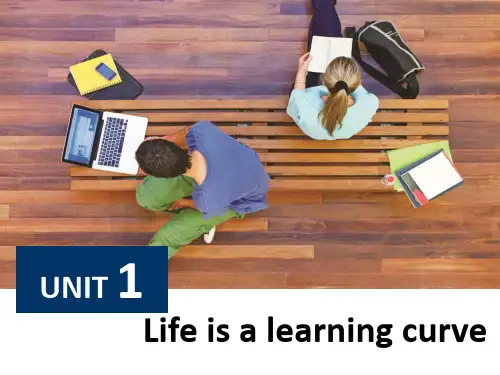
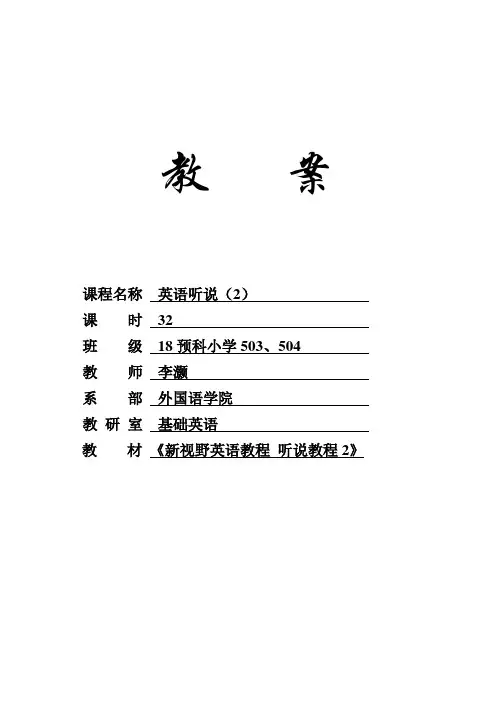
教案课程名称英语听说(2)课时32班级18预科小学503、504教师李灏系部外国语学院教研室基础英语教材《新视野英语教程听说教程2》教学题目Unit 1教学目标Pronunciation: Distinguish four groups of phonetic sounds: Listening: Get familiar with the topic of “food”.Speaking: Memorize useful expressions of showing likes and dislikes: ●What do you think about/of...?●How do you like...?●I love/like it.●I hate it.●It’s great.●It’s horrible.教学设计教学环节教师活动安排与建议(一)Warming-upListen to a song related to the topicof “Chicken Fried”.●By listening to the song, students (Ss) aregetting to know the theme of the unit.●The song “Chicken Fried”was recordedin 2003 by the Zac Brown Band, whosefrontman Zac Brown wrote it, for the2005 album Home Grown. The song hasalso been placed at number 39 forthe Taste of Country’s “Top 100 CountrySongs of all Time” chart.(二)Telling Apart1.Help Ss practice the pronunciationof the phonetic sounds:2.Read the proverbs and sayings andpractice the tongue twister.●Play the recording and ask Ss to read aloud.●Correct their pronunciation when necessary.●For more exercises, please see Optionalexercises in Teacher’s Book.(三)Testing Your Ears1.Read new words, phrases andexpressions, and proper names.2.Listening exercises: simplesentences, conversations and apassage.3.Watch a video about an“Automatic Restaurant”inNuremberg, Germany.●Explain each new word, phrase and propername with one example sentence presentedin PPT.●When doing exercises, tell Ss to read thefour choices in advance;pay attention to theimportance of grammatical coherence.●Watch the video and try to answer thefollowing questions presented in PPT.。
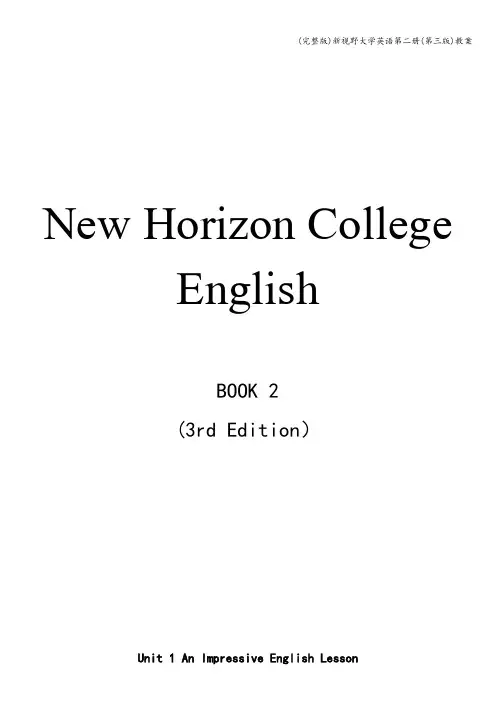
New Horizon CollegeEnglishBOOK 2(3rd Edition)Unit 1 An Impressive English Lesson课型:□ 理论课√ 理论、实践课□ 实践课课时分配: 6教学环境:多媒体教室教学目标:After studying this unit, the students are expected to be able to:1. understand the main idea and structure of Section A and Section B;2. master the key language points and grammatical structures in the texts3。
talk about language teaching and learning and express their opinions about current way of teaching in an English class;4. read with the skill ―finding key ideas in sentences;5. write a composition with three main parts: introduction, body and conclusion. Key Issues:1. VocabularyTedious, absorbed, allergic, capture, condense, exceed, distinguish, distinctive, complimentary, complementary, proclaim, evidently, adequate, competent,adjust, beneficial2。
SkillsLearn to read with the skill ―finding key ideas in sentences and write a composition with three main parts: introduction, body and conclusion.Potential Problems and Difficulties●To talk about language teaching and learning●write a composition with three main parts: introduction, body and conclusion。
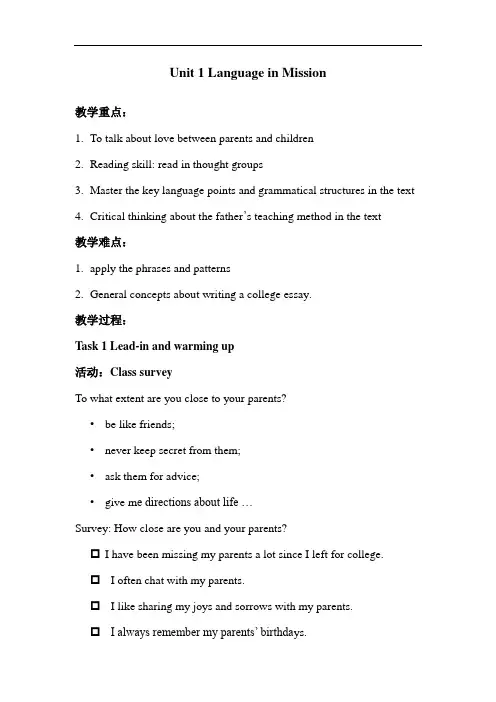
Unit 1 Language in Mission教学重点:1.To talk about love between parents and children2.Reading skill: read in thought groups3.Master the key language points and grammatical structures in the text4.Critical thinking about the father’s teaching method in the text教学难点:1.apply the phrases and patterns2.General concepts about writing a college essay.教学过程:Task 1 Lead-in and warming up活动:Class surveyTo what extent are you close to your parents?•be like friends;•never keep secret from them;•ask them for advice;•give m e directions about life …Survey: How close are you and your parents?☐I have been missing my parents a lot since I left for college.☐I often chat with my parents.☐I like sharing my joys and sorrows with my parents.☐I always remember my parents’ birthda ys.☐I know about my parents’ hobbies.☐My parents allow me to make my own decisions.Task 2 Text studyLanguage focus活动:Reading comprehension and discuss these questions in groups1) What does the son think of the father? (Para. 1) A tedious oddity:a father he is obliged to listen to and a man absorbed in the rules ofgrammar.2) Why was the writer shocked by his student’s answer? (Paras. 2-4)She is unable to describe her excursion to Europe with the right words.3) Why should students not be blamed for their language deficiency?(Paras. 6-7) The learning environment is misleading.4) How should grammar be taught as far as the writer is concerned?(Paras.8-10) Grammar must be handled delicately, step by step. An effective way of teaching could arouse children’s interest in learning English grammar. An example: a grammar lesson with my son Difficult sentences1.If I am the only parent who still corrects his child’s English, thenperhaps my son is right. To him, I am a tedious oddity: a father he is obliged to listen to and a man absorbed in the rules of grammar, which my son seems allergic to. (Para. 1)Meaning: My son is probably right if there is no other parent like mewho still corrects his child’s mistakes in English. To my son, I am a boring and strange father, who he has to listen to; I am also the one who pays lots of attention to grammar rules, which he doesn’t seem to like. 2.The civilization of Greece and the glory of Roman architecture werecaptured in a condensed non-statement. (Para. 4)Meaning: The civilization of Greece and the glory of Roman architecture were just described in one word rather than a complete statement because of her inability to choose appropriate words to express herself.3. Perhaps, language should be looked upon as a road map and a valuable possession: often study the road map (check grammar) and tune up the car engine (adjust vocabulary). Learning grammar and a good vocabulary is just like driving with a road map in a well-conditioned car. (Para. 11)Meaning: Maybe, you should regard language as a road map and a very precious property you have. You should often look at the road map (review grammar) and make small changes to your car engine (improve vocabulary).Task 3Assignment:How to write a college essay:An essay normally has three main parts: Introduction, body andconclusion.Introduction: The introduction part is usually one short paragraph that introduces the topic to be discussed and the thesis statement. A thesis statement can be an opinion, an attitude or a stand about the topic. Body: The body is the main part of an essay. It may contain several short paragraphs that use the development methods of examples, narrative, cause and effect, comparison and contrast, classification, argumentation, etc.Conclusion: The conclusion wraps up the discussion of a certain topic. It can briefly summarize the main points discussed and can also restate the thesis statement by using different words and structures. At the end of the conclusion, th e writer’s final thoughts on the topic may be added such as a predication, a suggestion, or a warning. Writing practice Directions: Write an essay of no less than 150 words on one of the following topics. One topic has an outline you can follow.Topic: Grammar, a headache to meIntroduction:Thesis statement: English Grammar is a big headache to me.Body: Example: The difference between used to and be used to Conclusion: I’m allergic to learning English grammar.More topics: • Learning English through imitation / repetition •Learning English with / without grammarUnit 5 Relax and explore教学重点:1.Talk about different kind of holidays and interesting places2.Introduce a town/city in China教学难点:1.Listen for people’s preference of holidays by indentifyingcomparatives2.make and take orders in a restaurant教学过程:Opening-up1.Read the statements. Then underline the alternatives which are true foryou or fill in the blanks according to your own experiences.2.Work in pairs and compare your answers.Listening to the world1.Sharing1)Watch a podcast for its general idea.2)Watch part 1 and choose the thing you hear3)Notes: New England (Northeastern corner of United states,consisting of six states of Maine )2.Listening: fill the blanks in the chart3.Viewing1)Notes: Buenos Aires2)Notes: ArgentinaQuestions:1 What difficulties you encountered while learning English?1) I have a limited vocabulary2) I have difficulty understanding authentic listening materials.2. In your opinion, what factors affect intelligence? Why?I prefer going to the cinema because it provides better sound effects.Besides, with more people around, the atmosphere is much better than when I watch movies alone at home.Role-playWork in pairs and role-play one of the following situations by using skills for taking orders in a restaurant.Situation 1: Making orders based on menu ASituation 2: Making orders based on menu BAssignment:Work in groups of four. Share briefly with your group members a recent event you went to, e.g. a festival, a concert, a sports event, an exhibition, a play, a party, or a film.。
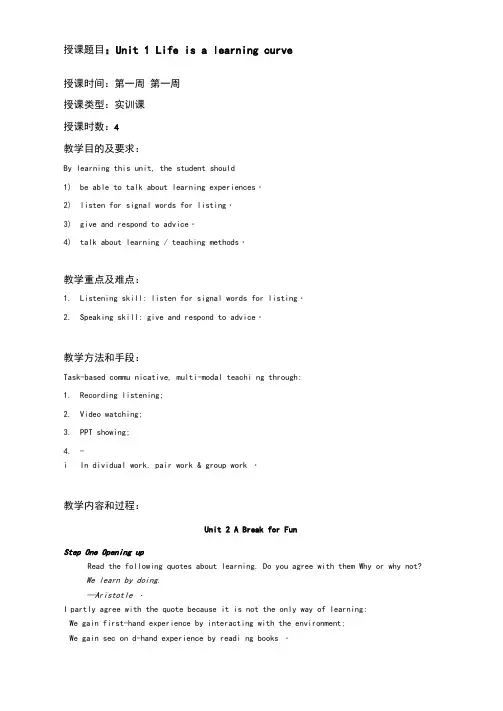
授课题目:Unit 1 Life is a learning curve授课时间:第一周第一周授课类型:实训课授课时数:4教学目的及要求:By learning this unit, the student should1)be able to talk about learning experiences・2)listen for signal words for listing・3)give and respond to advice・4)talk about learning / teaching methods・教学重点及难点:1.Listening skill: listen for signal words for listing・2.Speaking skill: give and respond to advice・教学方法和手段:Task-based commu nicative, multi-modal teachi ng through:1.Recording listening;2.Video watching;3.PPT showing;4.-i In dividual work, pair work & group work ・教学内容和过程:Unit 2 A Break for FunStep One Opening upRead the following quotes about learning. Do you agree with them Why or why not?We learn by doing.—Aristotle ・I partly agree with the quote because it is not the only way of learning:We gain first-hand experience by interacting with the environment;We gain sec on d-hand experience by readi ng books ・A little knowledge is a dangerous thing・— Albert EinsteinYes・ It is dangerous for a person who knows a little about something thinks he knows it all.The best way to learn is to teach・—AnonymousYes. Going through the process of trying to explain something to others will help you understand, absorb and consolidate what you have learned.Step Two Listening to the world\. 9■ Sharing1.Watch a podcast for its general idea・2.Watch Part 1 and fill in the blanks.3.Watch Part 2 and check the true statements.4.Watch Part 3 and fill in the blanks・5.Work in pairs and discuss the question.III.Listening1.Introduce the listening Skill: Listening for signal words for listing2.Listen for the total number of items at the beginning3.Listen for words and expressions that signal the beginning, following and end of thelisting4.・ the last, the final, lastly, and fin ally5.Listing items with equal value6.・ to begin with, to start with, furthermore, moreover, in addition, besides, what'smore, the last but not the least, lastly, finally7.Words and expressions indicating importanee8.expressions: above all z the most important / obvious / noteworthy9.Adjectives: main, vital, sigrdficant, chief, central, principal, primary, major,distinctive, and the -est forms of adjectives Listen to Part 2 of the radio program.Then match the people to the film stars they like.10.Listen to a radio program and rearrange the following expressions.11.Listen to the radio program again and complete the table・12.<13.Fill in the blanks.14.IV.ViewingRead the program information below and check the true statements.2. Read the statements・ Then watch the video clip and underline the correct alternative・3.4. Read the statements and the answer choices・ Then watch the video clip again andchoose the best answers・Step Three Speaking for communication1.Read the statements. Then listen to a conversation and check the true statements ・2.Read the table. Then listen to the conversation and write G for giving advice and Rfor responding to advice in the right column.3.Speaking Skill: Giving and responding to adviceGiving and responding to advice in an appropriate way are useful and important speaking skills・Expressions for giving adviceWhy don't you...?My( main/personal) recomme ndati on /suggestion/ is/would be..・If that happened to me/ If I were in your place/ if I were you/ In that case, l z d recommend..・Do you think it is a good idea..・?The sooner you...the better....might work/ would probably work/is worth a try.If you ask me/ The way I see it, it probably would have been better(not) to have... Expressions for responding to advice• Thank you, l z ll take that into consideration.• Thanks・ That sounds good/interesting.I had n't thought of that before ・ Thank you so much for offering that advice ・Thank you for the advice・ I'll try..・Maybe you're right・Thanks for saying that・4., Look at the pictures and read the conversations below・ Then fill in the blanks using the words in brackets・6.Role-play the situations・Step Four Further practice in listeningI.Short Conversations1Q: What can we learn from the conversation ?B The woman should seek help from the writing center.2Q: Why does the woman choose to learn French?D She thinks speaking French is a must for cultured people・3Q: What did the man do last night?D He attended a speech・4Q: What made Melissa unhappy ?C That she lost her chance to en ter the con test ・5Q: What does the man think of the woman's opinion ?A It is one-sided・II.L ong Conversation1Q: How is the woman doing in the man's class?C She often fails to turn in her homework on time・2Q: What does the woman think of learning Spanish ?D It presents difficulty for her.3Q: What do we know from this conversation about the man ?A He has a good personal relationship with the woman.4Q: What is the woman most likely to do after talking with the man ?C Work harder in her Spanish class・III.Passages1. Passage one1Q: What do you know about the speaker's Spanish learning experience in high school?D She showed dissatisfaction with the slow pace of her class・2Q: What made the speaker feel more frustrated while learning Spanish in high school?A She had to learn the material that she already knew・3Q: What did the speaker say about her study of Spanish literature in college?C It proved to be an unbalanced way to learn the Ianguage・4Q: Which experienee benefited the speaker most in terms of her use of Spanish ?D She taught Spanish speakers how to speak English・2.Passage two1)alternative2)numerous3)traditional4)academic5)countryside6)athletes7)take advantage of8)Sec on dary9)in a collective effort10)serve as作业:Preview Section B参考文献:1.郑树棠.新视野大学英语视听说教程(第三版)第二册[M].北京:外语教学与研究出版社,2015.2.郑树棠.新视野大学英语视听说教程(第三版)第二册教师用书[M].北京:外语教学与研究出版社,2015.3.夏纪梅•现代外语课堂设计理论与实践[M].上海:上海外语教育出版社,2003.4.秦秀白.《新世纪大学英语系列教程》第二册[M].上海:上海外语教育出版社,2007 (2009重印)・5.杨治中主编.《新起点大学基础英语教程系列》第二册[M].北京:外语教学与研究出版社,2004.6.翟象俊等主编.《21世纪大学英语系列教程》第二版第二册[M].厦门:复旦大学岀版社,2008.课后小结:。
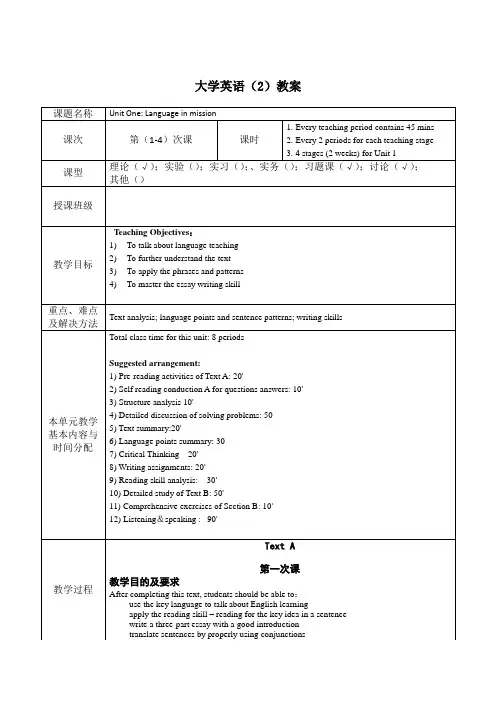
大学英语(2)教案use English learning strategies consciously教学重难点Using proper language to talk about English learningHow to apply the reading skill – reading for the key idea in a sentence教学材料教学方法1. 教学材料:Text A课文、练习2. 教学方法:Under the guidance of student-centered principle, apply communicative and heuristic teaching methods, stimulate students’ interest in learning English and get students involved in class participation教学过程一、课前导入Talking about your experience of learning EnglishWatch the video clip and discuss the following question in pairs.1)According to the speaker, in what ways did Chinese students learn English?Chinese students practice their English by screaming it.2)Do you agree with what he said about Chinese students learning English? Why or why not.Yes, I just learned English exactly that way.No, we have learned English in different ways.3)How do you learn English? What do you think of your way of English learning?I learn English by:listening to the teacher carefully in classtaking notes …to go over lessons latercatching every chance to practice speakinglistening and reading a lotdoing enough exercises to practice grammar rulesI think my way of English learning is:effective, ineffective, interesting, boringchallenging but rewardingexamination-oriented二、文本学习1. Global understanding of the text1)Scan the text in three minutes and fill in the blanks.After I read the passage, I know the text talking about how _________ and __________ can be taught efficiently. The writer might be a ________ and a ________________ as well.2)What is the writing style of the text? Why?The writing style of the text is relaxed, which is proved by a lot of short sentences and paragraphs, casual verbs, daily talks and simple modifiers.3)Map the text structure and fill in the blanks.2. Detailed understanding of the textRead the text again and answer the following questions.1) Why does the son think that his father is a tedious oddity?Because he is tired of listening to his father and he is not interested in grammar rules.2) Why does the author think that students’ language deficits should be blamed on schools?Because the schools fail to set high standards of language proficiency. They only teach a little grammar and less advanced vocabulary. And the younger teachers themselves have little knowledge of the vital structures of language.3) What does the father teach the son while giving him a grammar lesson?He familiarized his son with different parts of speech in a sentence and discussed their specific grammatical functions including how to use adverbs to describe verbs.4) What are the two things that the author uses to describe grammar and vocabulary?The author uses “road map” and “car” to describe grammar and vocabulary. Here, “road map” is considered as grammar and “car” as vocabulary.5) How do you understand the interjection “whoa!” said by the father toward the end of the text?Since the subjunctive mood his son used is a fairly advanced grammar structure, the in terjection “whoa!” reflects the tremendous pride the father had toward his son; it also reflects the author’s humor in using the word because it was once used by his student, though in two different situations and with two different feelings.第二次课一、文本拓展1) Text SummaryAn Impressive English LessonTo my son, I am a _____________: a father he is __________ listen to and a man ____________ the rules of grammar. And I got ______________ this because my student was unable to describe properly her feeling on her __________ to Europe.However, it doesn’t ________________ to criticize our students. They unfairly bear the bulk of the criticism for these __________________ because there is a sense that they _________________. On one hand, they are misled by the____________. On the other hand, school fails to _________________ the essential framework of language, accurate grammar and proper vocabulary. Perhaps, language should be looked upon as a _________ and a ___________________: often study the road map (check grammar) and ________ the car engine (adjust vocabulary). Learning grammar and a good vocabulary is just like driving with a road map in a ________________ car. __________, _________, and __________ communication depends upon grammar and a good vocabulary, the two __________ assets for students, but they are ________________ in schools.2) Language Points3. Criticl thinking1)What do you think of the “impressive English lesson”? Is it effective?●Yes. Because the lesson aroused children’s interest in learning English grammar.●Yes. Because the way to learn grammar is more natural, interesting and enjoyable.●Yes, because learners become more motivated when learning something they like.●No. because it’s like a street learning without forma l instruction.2) Do you think English grammar helps you a lot in learning English? Why or why not?English grammar helps a lot:●Order sentences correctly.●Use words properly.●Talk with other English speakers confidentlyEnglish grammar is of little help:●Only give rules that are hard to remember.●It is not helpful in a real-life setting due to the limited time to think and recall the rules.●Not always applicable to the real language, especially idioms.3) How can you effectively enlarge your vocabulary?●Read more English from online sources.●Watch English TV / listen to English radio / watch English online videos.●Talk often with English speakers.●Listen carefully and extensively.●Use dictionaries to look up unfamiliar words.●Use new words as often as possible.二、写作训练 (P13)1)Structure AnalysisAs the name of our textbook implies, we read English in order to write in it. But how to write in the English way?As is known to all of us, what we write reflects what we think; and how we write mirrors how we think. In that light, our best way of writing in English is to know well how to think in English as the American or British people do. What is their way of thinking then?Different from us who think in the spiral way (螺旋式), they tend to think in the linear way (线性方式). As far as paragraph writing is concerned, deduction (演绎法) is typical of their linear way of thinking, as shown below:Starting from this book, you are moving from paragraph writing to short essay writing. In a likely manner, however, we will go through the same process for essay writing as we did for paragraph writing. In college writing, an essay normally has three main parts: introduction, body,What are minor details and what are the main ideas. (Many words in a sentence describe things about the subject of the sentence but they merely find the details to it. If we ask when, what, where, or why, we will find out these details, which further help us to see the key idea of the sentence.)4) What to keep in mind to find out the key idea of a sentence?Of course, we cannot always easily decide which details are simply descriptive and which add much to the key idea. However, the starting point for determining the key idea ina sentence is to find who or what the sentence is about and what the person or object isdoing.2. 文本学习1) Applying the reading skillWhat can the title “The Great Journey of Learning” tell us?The title “The Great Journey of Learning”, coupled with the topic “Language in Mission” of the unit, tells us the central idea—The process of learning has a profound effect on one’s life.2) Detailed understanding of the textRead Text B and choose the best answer to each of the questions (Page 24)Read the text again and think about the following questions:1. Why did Malcolm X want to learn English? (Para.2)Because he was poorly educated, he felt inadequate to teach his new beliefs to others.2. What motivated Malcolm X to launch on a quest to overcome his language deficiencies? Malcolm X’s considerable frustration at his inability to read and write launched him on a quest to overcome his deficiencies.3. How did Malcolm X move from basic literacy toward true proficiency? (Para. 5)He copied dictionary, read everything he had written aloud and logged important things that happened every day. Repetition helped move him from basic literacy toward true proficiency. 4. What did Malcolm X obtain from language learning? (Paras. 9-10) Reading had changed forever the course of Malcolm X’s life. As he acquired knowledge, his horizons expanded. He had left behind the narrow, ignorant world of his youth to join the world community of thoughts and actions ever since he started with his great journey of learning English in prison.3. 知识总结听说训练第四次课教学目的及要求Talk about learning experiencesListen for signal words for listingGive and respond to adviceTalk about learning / teaching methods教学过程1. Listening to the worldSharing1) Watch a podcast for its general idea.The podcast is mainly about the things people are learning at the moment and the most difficult thing they have ever learned.2) Watch Part 1 and fill in the blanks●new things●At the moment●quite difficult3) Watch Part 2 and check the true statements.ListeningListening skillsListening for signal words for listing●Listen for the total number of items at the beginning●Listen for words and expressions that signal the beginning, following and end of the listing⏹ e.g. the last, the final, lastly, and finally●Listing items with equal value⏹ e.g. to begin with, to start with, furthermore, moreover, in addition, besides, what’smore, the last but not the least, lastly, finally●Words and expressions indicating importance⏹expressions: above all, the most important / obvious / noteworthy⏹Adjectives: main, vital, significant, chief, central, principal, primary, major,distinctive, and the –est forms of adjectives1)Listen to a radio program and rearrange the following expressions.e-c-a-g-d-h-b-f2) Listen to the radio program again and complete the table.●speak●saying the wrong thing。
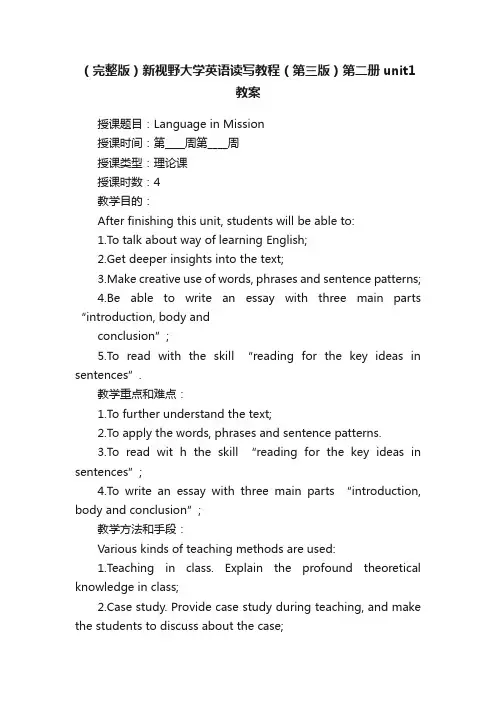
(完整版)新视野大学英语读写教程(第三版)第二册unit1教案授课题目:Language in Mission授课时间:第____周第____周授课类型:理论课授课时数:4教学目的:After finishing this unit, students will be able to:1.To talk about way of learning English;2.Get deeper insights into the text;3.Make creative use of words, phrases and sentence patterns;4.Be able to write an essay with three main parts “introduction, body andconclusion”;5.To read with the skill “reading for the key ideas in sentenc es”.教学重点和难点:1.To further understand the text;2.To apply the words, phrases and sentence patterns.3.To read wit h the skill “reading for the key ideas in sentences”;4.To write an essay with three main parts “introduction, body and conclusion”;教学方法和手段:Various kinds of teaching methods are used:1.Teaching in class. Explain the profound theoretical knowledge in class;2.Case study. Provide case study during teaching, and make the students to discuss about the case;3.Bilingual and full English teaching;4.Applying modern multimedia teaching technologies;5.Taking advantage of abundant network teaching resources.教学内容和过程:Section A An Impressive English LessonStep One Warming-up Activities 30 minutesI.Lead-in:Discuss the following questions:1.What are the key factors that help people learn English asa foreign language? Good course, excellent syllabus based on some principles;Highly developed methodologies, teaching four primary skills of language acquisition;Put the four skills into a discourse;Analyze three different kinds of interactions.2.Do you have any problem in English learning?—I always feel it difficult t o…—It’s not easy for me to…understand what others say;remember so many words;learn the grammar;read quickly;speak in public…3.Do you think grammar is important in English learning?—Yes.The basic building blocks of a language;essential for effective communication;put the words in the right order;help to convey correct, meaningful message.—No.as long as one can understand what other is saying;dynamic and no language is fixed;speak their native language without having studied its grammar.II.Cultural backgroundAmerican university education1.What is Communicative Language Teaching?A type of teaching method;Develop the communicative ability as well as the knowledge of grammar; Learningby doing;Make classroom situation of real foreign language environment.2. What are the features of Communicative Language Teaching? Communicative competence is the goal;An integration of grammatical and functional teaching;Accuracy is secondary to conveying a message;Focus on communicative and contextual factors in language use;Learner-centered and experience-based.3. What is the role of teacher in Communicative Language Teaching?A f acilitator of students’ learning;A manager of classroom activities;An advisor of students’ questions;A co-communicator in the communicative activity.Step Two Text Study 80 minutesI.Interactive reading of the text1. Reading comprehension1)What does the son think of the father? (Para. 1)A tedious oddity: a father he is obliged to listen to and a man absorbed in therules of grammar.2)Why was the writer shocked by his student’s answer? (Paras. 2-4)3)She is unable to describe her excursion to Europe with the right words.4)What conclusion did the writer draw from the example of his student?(Para. 5)Students unfairly bear the bulk of the criticism for these knowledge deficits because there is a sense that they should know better.5)Why should students not be blamed for their language deficiency? (Paras.6-7)6)The learning environment is misleading.7)Why should students not be blamed for their language deficiency?(Paras.6-7)8)They are not learning the language adequately and efficiently in school.9)How should grammar be taught as far as the writer is concerned?(Paras.8-10)10)Grammar must be handled delicately, step by step. An effective way ofteaching could arouse children’s interest in learning English grammar.11)An example: a grammar lesson with my son12)2. Structure of the textIntroductionIn his son’s eyes, the father is one who he has to obey and an oddity absorbed in grammar. (Para.1)He was shocked by his student’s inability todescribe properly her excursion to Europe. (Paras. 2-4)Thesis of the narration: It is unfair to blame students for their language deficiency. (Para.5)BodyExplains why stud ents shouldn’t be blamed for their language deficiency by providing two reasons and one example. (Paras. 6-10)Elaborates the importance of grammar and vocabulary in learning English. (Paras. 11-13)Concluding partNarrates another incident where his son unconsciously uttered a grammatically perfect sentence with a subjunctive mood, which made the author so proud of his son. (Paras. 14-17)3. Summary of the TextTo my son, I am a _____________: a father he is __________ listen to and a man ____________ the rules of grammar. And I got ______________ this because my student was unable to describe properly her feeling on her __________ to Europe.However, it doesn’t ________________ to criticize our students. They unfairly bear the bulk of the criticism for these __________________ because there is a sense that they _________________. On one hand, they are misled by the____________. On the other hand, school fails to _________________ the essential framework of language, accurate grammar and propervocabulary.Perhaps, language should be looked upon as a _________ and a ___________________: often study the road map (check grammar) and ________ the car engine (adjust vocabulary). Learning grammar and a good vocabulary is just likedriving with a road map in a ________________ car. __________, _________, and __________ communication depends upon grammar and a good vocabulary, the two __________ assets for students, but they are ________________ in schools.II. Language FocusWords and expressions1. oddity: n. [C] a strange or unusual person or thing 怪人;怪物;奇特的东西With his neat suits on, he felt like an oddity walking in this poor neighborhood.穿着笔挺的西装走在这个贫民区里,他觉得自己就像个怪物。
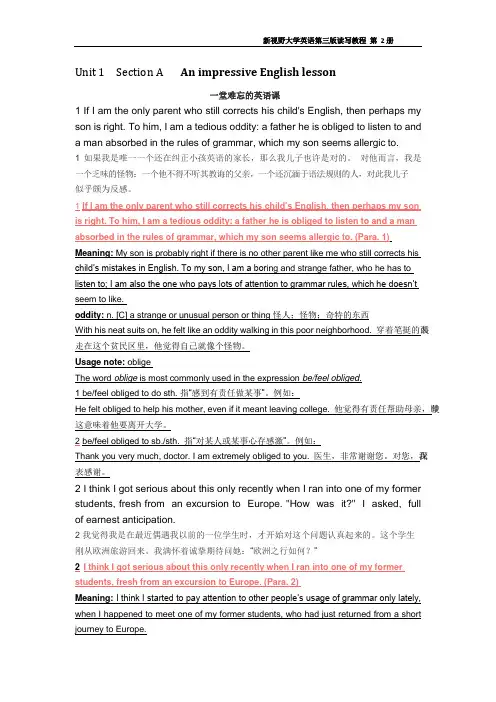
Unit 1 Section A An impressive English lesson一堂难忘的英语课1 If I am the only parent who still corrects his child's English, then perhaps my son is right. To him, I am a tedious oddity: a father he is obliged to listen to anda man absorbed in the rules of grammar, which my son seems allergic to.1 如果我是唯一一个还在纠正小孩英语的家长,那么我儿子也许是对的。
对他而言,我是一个乏味的怪物:一个他不得不听其教诲的父亲,一个还沉湎于语法规则的人,对此我儿子似乎颇为反感。
1 If I am the only parent who still corrects his child’s English, then perhaps my sonis right. To him, I am a tedious oddity: a father he is obliged to listen to and a man absorbed in the rules of grammar, which my son seems allergic to. (Para. 1)Meaning: My son is probably right if there is no other parent like me who still corrects his child‟s mistakes in English. To my son, I am a bor ing and strange father, who he has tolisten to; I am also the one who pays lots of attention to grammar rules, which he doesn‟t seem to like.oddity: n. [C] a strange or unusual person or thing 怪人;怪物;奇特的东西With his neat suits on, he felt like an oddity walking in this poor neighborhood. 穿着笔挺的西装走在这个贫民区里,他觉得自己就像个怪物。
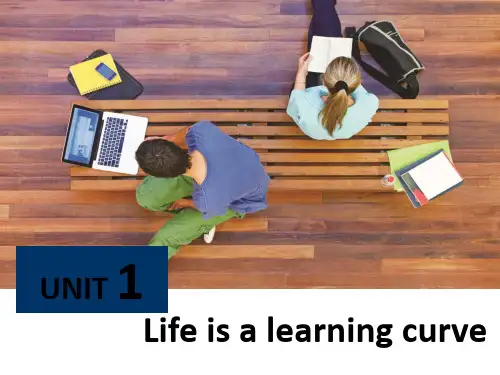
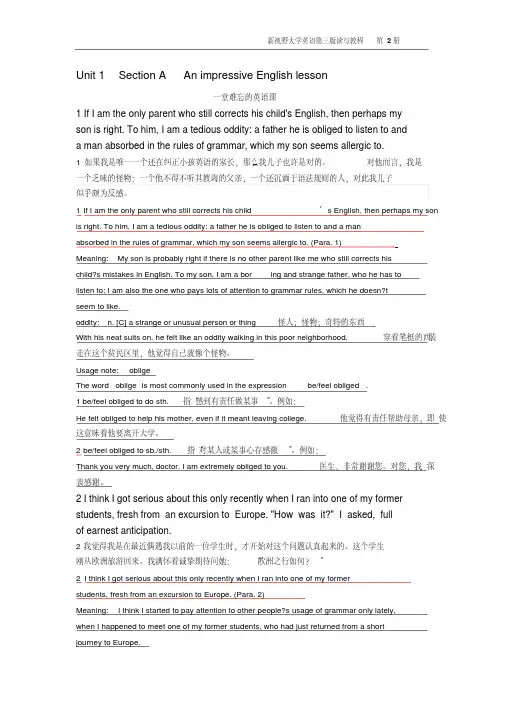
Unit 1 Section A An impressive English lesson一堂难忘的英语课1 If I am the only parent who still corrects his child's English, then perhaps myson is right. To him, I am a tedious oddity: a father he is obliged to listen to anda man absorbed in the rules of grammar, which my son seems allergic to.1 如果我是唯一一个还在纠正小孩英语的家长,那么我儿子也许是对的。
对他而言,我是一个乏味的怪物:一个他不得不听其教诲的父亲,一个还沉湎于语法规则的人,对此我儿子似乎颇为反感。
1 If I am the only parent who still corrects his child’s English, then perhaps my son is right. To him, I am a tedious oddity: a father he is obliged to listen to and a manabsorbed in the rules of grammar, which my son seems allergic to. (Para. 1)Meaning: My son is probably right if there is no other parent like me who still corrects hischild?s mistakes in English. To my son, I am a bor ing and strange father, who he has tolisten to; I am also the one who pays lots of attention to grammar rules, which he doesn?tseem to like.oddity: n. [C] a strange or unusual person or thing 怪人;怪物;奇特的东西With his neat suits on, he felt like an oddity walking in this poor neighborhood. 穿着笔挺的西装走在这个贫民区里,他觉得自己就像个怪物。
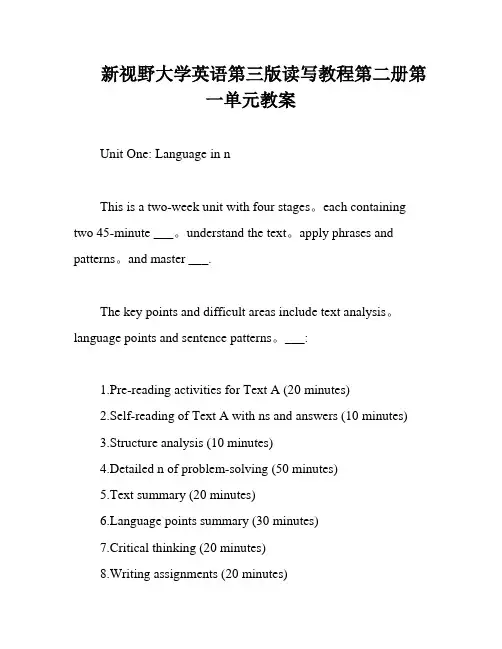
新视野大学英语第三版读写教程第二册第一单元教案Unit One: Language in nThis is a two-week unit with four stages。
each containing two 45-minute ___。
understand the text。
apply phrases and patterns。
and master ___.The key points and difficult areas include text analysis。
language points and sentence patterns。
___:1.Pre-reading activities for Text A (20 minutes)2.Self-reading of Text A with ns and answers (10 minutes)3.Structure analysis (10 minutes)4.Detailed n of problem-solving (50 minutes)5.Text summary (20 minutes)nguage points summary (30 minutes)7.Critical thinking (20 minutes)8.Writing assignments (20 minutes)9.___ (30 minutes)10.Detailed study of Text B (50 minutes)prehensive exercises of n B (10 minutes)12.Listening and speaking (90 minutes)During the first teaching d。
the focus will be on Text A。
Pre-reading activities will be conducted for 20 minutes。
New Horizon College EnglishBOOK 2(3rd Edition)Unit 1 Text AEx.1 Understanding the text1、Because he is tired of listening to his father and he is not interested in grammar rules.2、The civilization of Greece and the glory of Roman architecture are so marvelous and remarkable that they should be described at least in a brief account; however, what the student could do was only one single utterance :“whoa!” without any any specific comment.3、Because the schools fail to set high standards of language proficiency. They only teach a little grammar and less advanced vocabulary. And the younger teachers themselves have little knowledge of the vital structures of language.4、Because teaching grammar is not an easy job and most of the students will easily get bored if it’s not properly dealt with.5、He familiarized his son with different parts of speech in a sentence and discussed their specific grammatical functions including how to use adverbs to describe verbs.6、Because the son had never heard about the various names and functions of words in an English sentence before.7、The author uses “road map”and “car”to describe grammar and vocabulary. Here,“road map”is considered as grammar and “car”as vocabulary.8、Since the subjunctive mood his son used is a fairly advanced grammar structure, the interjection“whoa!”reflects the tremendous pride the father had toward his son; it also reflects the author’s humor in using the word because it was once used by his student, though in two different situations and with two different feelings.Ex.3 Words in use1.condense2.exceed3.deficit4.exposure5.asset6.adequatepetent8.adjusting9.precisely 10.beneficialEx.4 Word building-al/-ial: managerial/editorial/substance/survival/tradition/margin-cy : consistency/accuracy/efficient-y : recovery/ministry/assemblyEx.5 Word building1.editorial2.recovery3.accuracy4.substance5.managerial6.margin7.assembly8.Ministry9.survival 10.tradition 11.consistency 12.efficientEx.6 Banked cloze1-5: L C J A I 6-10: O N E H FEx.7 Expressions in use1.feel obliged to2.be serious about3.run into4.distinguish between5.thrust upon6.was allergic to7.get lost8.be attracted to9.make sense 10.looked upon asEx.8 Structured writingSome bookworms in my dormitory often spend hours reading their “Bible”, Practical English Grammar, and do a lot of exercises in that book , but I don’t care about it at all. My assumption is since I have never learned Chinese grammar, what’s the sense of learning English grammar? In fact, English grammar has always been a big headache to me.English grammar is very complicated because, unlike Chinese, there are many verb tenses. Even stranger than verb tenses, English grammar also contains something very confusing. For example, I don’t remember how many times my middle school teacher tried to“impose”the differences between used to and be used to on us. Sometimes he would go on with the explanation for 20 minutes or so. He even summarized the differences by listing three or four points for us to memorize. However, they could never stay in my head . I don’t remember how many times I got it wrong with the sentences containing used to or be used to on my exams . I was really confused with these two phrases,and I can never get them right.In brief, I’m allergic to learning English grammar. Curiously, I just wonder if the native speakers of English have a microcomputer in their brain to help them utter the two phrases promptly with just a click of their brain mouse!Ex.9 E-C Translation人们普遍认为英语是一种世界语言,经常被许多不以英语为第一语言的国家使用。
新视野⼤学英语第三版电⼦教案book2unit1AUnit 1 Section A An impressive English lesson⼀堂难忘的英语课1 If I am the only parent who still corrects his child's English, then perhaps my son is right. To him, I am a tedious oddity: a father he is obliged to listen to andof earnest anticipation.2 我觉得我是在最近偶遇我以前的⼀位学⽣时,才开始对这个问题认真起来的。
这个学⽣刚从欧洲旅游回来。
我满怀着诚挚期待问她:“欧洲之⾏如何?”2 I think I got serious about this only recently when I ran into one of my former students, fresh from an excursion to Europe. (Para. 2)Meaning: I think I started to pay attention to other people’s usage of grammar only lately, when I happened to meet one of my former students, who had just returned from a short journey to Europe.3 “How was it?” I asked, full of earnest anticipation. (Para. 2)Meaning: When I asked about how her trip to Europe had been, I was expecting her response anxiously and sincerely. How was it?: (spoken) often used in conversation to ask sb. about their opinion or experience of sth. 怎么样?(⼝语常⽤表达,⽤于询问看法或经历)Did you watch the movie last night? How was it? 你昨天晚上看那部电影了吗?感觉怎么样?I was told that you had traveled to many places in Asia recently. How was it? 有⼈告诉我Note: The heavens means “the sky”. Here “search the heavens for the right words” implies the student tried hard to find suitable words to describe what she saw and experienced when traveling in Europe.Usage note: search, search for1 search: look through 检查;搜查They searched the man in front of me from head to foot. 他们把我前⾯的男⼦从头到脚搜查了⼀遍。
教案课程名称新视野英语教程听说教程2课时班级专业教师系部教研室教材《新视野英语教程听说教程2》教学题目Unit 1教学目标Pronunciation: Distinguish four groups of phonetic sounds: Listening: Get familiar with the topic of “food”.Speaking: Memorize useful expressions of showing likes and dislikes: ●What do you think about/of...?●How do you like...?●I love/like it.●I hate it.●It’s great.●It’s horrible.教学设计教学环节教师活动安排与建议(一)Warming-upListen to a song related to the topicof “Chicken Fried”.●By listening to the song, students (Ss) aregetting to know the theme of the unit.●The song “Chicken Fried” was recordedin 2003 by the Zac Brown Band, whosefrontman Zac Brown wrote it, for the 2005album Home Grown. The song has alsobeen placed at number 39 for the Taste ofCountry’s “Top 100 Country Songs of allTime” chart.(二)Telling Apart1.Help Ss practice the pronunciationof the phonetic sounds:2.Read the proverbs and sayings andpractice the tongue twister.●Play the recording and ask Ss to read aloud.●Correct their pronunciation when necessary.●For more exercises, please see Optionalexercises in Teacher’s Book.(三)Testing Your Ears1.Read new words, phrases andexpressions, and proper names.2.Listening exercises: simplesentences, conversations and apassage.3.Watch a video about an“Automatic Restaurant” inNuremberg, Germany.●Explain each new word, phrase and propername with one example sentence presentedin PPT.●When doing exercises, tell Ss to read thefour choices in advance;pay attention tothe importance of grammatical coherence.●Watch the video and try to answer thefollowing questions presented in PPT.。
New Horizon College EnglishBOOK 2(3rd Edition)Unit 1 An Impressive English Lesson课型:□理论课√理论、实践课□实践课课时分配:6教学环境:多媒体教室教学目标:After studying this unit, the students are expected to be able to:1. understand the main idea and structure of Section A and Section B;2. master the key language points and grammatical structures in the texts3. talk about language teaching and learning and express their opinions about current way of teaching in an English class;4. read with the skill ―finding key ideas in sentences;5. write a composition with three main parts: introduction, body and conclusion.Key Issues:1. VocabularyTedious, absorbed, allergic, capture, condense, exceed, distinguish, distinctive, complimentary, complementary, proclaim, evidently, adequate, competent, adjust, beneficial2. SkillsLearn to read with the skill ―finding key ideas in sentences and write a composition with three main parts: introduction, body and conclusion.Potential Problems and Difficulties●To talk about language teaching and learning●write a composition with three main parts: introduction, body andconclusion.●To apply the phrases and patternsMethodology:A combination of traditional teaching methods with the communicative approach will be adopted. Special attention should be paid to classroom interaction like questioning and answers. Small group works are always needed while discussing the questions and the difficult translation practice. More encouragement is needed and more guidance will be given in their extracurricular study.Teaching Aids: Visual aids, projector, stereo and microphoneGroup work and pair workConduct of Tasks and Activities(师生互动方式Mode of Interaction; 学习策略Learning Strategies)Students-centered, Task-based teaching and learningTeaching ProceduresStep 1 Lead-inI. Greeting and warming-up questions discussion.1. What are the key factors that help people learn English as a foreign language?2. Do you have any problem in English learning?3. Do you think grammar is important in English learning?II. Listening and discussing.1. Listening practice.2. In your opinion, what is the most effective way to learn English?III. Listening to a talk and answer questions on page 2Step 2 Section A An Impressive English LessonI. Cultural background American university education1.What is Communicative Language Teaching?A type of teaching method;Develop the communicative ability as well as the knowledge of grammar;Learning by doing;Make classroom situation of real foreign language environment.2. What are the features of Communicative Language Teaching? Communicative competence is the goal;An integration of grammatical and functional teaching;Accuracy is secondary to conveying a message;Focus on communicative and contextual factors in language use; Learner-centered and experience-based.3. What is the role of teacher in Communicative Language Teaching?A facilitator of students’learning;A manager of classroom activities;An advisor of students’questions;A co-communicator in the communicative activity.II. Language PointsWords and expressions1. oddity: n. [C] a strange or unusual person or thing 怪人;怪物;奇特的东西With his neat suits on, he felt like an oddity walking in this poor neighborhood. 穿着笔挺的西装走在这个贫民区里,他觉得自己就像个怪物。
授课题目:Unit 1 Life is a learning curve授课时间:第____周第____周授课类型:实训课授课时数:4教学目的及要求:By learning this unit, the student should1) be able to talk about learning experiences.2) listen for signal words for listing.3) give and respond to advice.4) talk about learning / teaching methods.教学重点及难点:1.Listening skill: listen for signal words for listing.2.Speaking skill: give and respond to advice.教学方法和手段:Task-based communicative, multi-modal teaching through:1.Recording listening;2.Video watching;3.PPT showing;4.Individual work, pair work & group work.教学内容和过程:Unit 2 A Break for FunStep One Opening upRead the following quotes about learning. Do you agree with them Whyor why not?We learn by doing.— Aristotle.I partly agree with the quote because it is not the only way of learning: We gain first-hand experience by interacting with the environment; We gain second-hand experience by reading books.A little knowledge is a dangerous thing.— Albert EinsteinYes. It is dangerous for a person who knows a little about something thinks he knows it all.The best way to learn is to teach.— AnonymousYes. Going through the process of trying to explain something to others will help you understand, absorb and consolidate what you have learned.Step Two Listening to the worldI.Sharing1.Watch a podcast for its general idea.2.Watch Part 1 and fill in the blanks.3.Watch Part 2 and check the true statements.4.Watch Part 3 and fill in the blanks.5.Work in pairs and discuss the question.II.Listening1.Introduce the listening Skill: Listening for signal words for listingListen for the total number of items at the beginningListen for words and expressions that signal the beginning, following and end of the listing. the last, the final, lastly, and finallyListing items with equal value. to begin with, to start with, furthermore, moreover, in addition, besides, what’s more, the l ast but not the least, lastly, finally Words and expressions indicating importanceexpressions: above all, the most important / obvious / noteworthy Adjectives: main, vital, significant, chief, central, principal,primary, major, distinctive, and the –est forms of adjectives Listen to Part 2 of the radio program. Then match the people to the film stars they like.2.Listen to a radio program and rearrange the following expressions.3.Listen to the radio program again and complete the table.4.Fill in the blanks.III.Viewing1.Read the program information below and check the true statements.2.Read the statements. Then watch the video clip and underline thecorrect alternative.3.Read the statements and the answer choices. Then watch the video clipagain and choose the best answers.Step Three Speaking for communication1.Read the statements. Then listen to a conversation and check the truestatements.2.Read the table. Then listen to the conversation and write G for givingadvice and R for responding to advice in the right column.Speaking Skill: Giving and responding to adviceGiving and responding to advice in an appropriate way are useful and important speaking skills.Expressions for giving adviceWhy don’t you…?My( main/personal) recommendation/suggestion/ is/would be…If that happened to me/ If I were in your place/ if I were you/ In that case, I’d recommend…Do you think it is a good idea…?The sooner you…the better.…might work/ would probably work/is worth a try.If you ask me/ The way I see it, it probably would have been better(not) to have…Expressions for responding to advice•Thank you, I’ll take that into consideration.• Thanks. That sounds good/interesting.I hadn’t thought of that before. Thank you so much for offering that advice.Thank y ou for the advice. I’ll try…Maybe you’re right.Thanks for saying that.3.Look at the pictures and read the conversations below. Then fill inthe blanks using the words in brackets.4.Role-play the situations.Step Four Further practice in listeningI.Short Conversations1 Q: What can we learn from the conversation?B The woman should seek help from the writing center.2 Q: Why does the woman choose to learn French?D She thinks speaking French is a must for cultured people.3 Q: What did the man do last night?D He attended a speech.4 Q: What made Melissa unhappy?C That she lost her chance to enter the contest.5 Q: What does the man think of the woman’s opinion?A It is one-sided.II. Long Conversation1 Q: How is the woman doing in the man’s class?C She often fails to turn in her homework on time.2 Q: What does the woman think of learning Spanish?D It presents difficulty for her.3 Q: What do we know from this conversation about the man?A He has a good personal relationship with the woman.4 Q: What is the woman most likely to do after talking with the man?C Work harder in her Spanish class.III. Passages1.Passage one1 Q: What do you know about the speaker’s Spanish learning experience in high school?D She showed dissatisfaction with the slow pace of her class.2 Q: What made the speaker feel more frustrated while learning Spanish in high school?A She had to learn the material that she already knew.3 Q: What did the speaker say about her study of Spanish literature in college?C It proved to be an unbalanced way to learn the language.4 Q: Which experience benefited the speaker most in terms of her use of Spanish?D She taught Spanish speakers how to speak English.2. Passage two1) alternative2) numerous3) traditional4) academic5) countryside6) athletes7) take advantage of8) Secondary9) in a collective effort10) serve as作业:Preview Section B参考文献:1.郑树棠. 新视野大学英语视听说教程(第三版)第二册[M]. 北京:外语教学与研究出版社,2015.2.郑树棠. 新视野大学英语视听说教程(第三版)第二册教师用书[M]. 北京:外语教学与研究出版社,2015.3.夏纪梅. 现代外语课堂设计理论与实践[M]. 上海:上海外语教育出版社,2003.4.秦秀白. 《新世纪大学英语系列教程》第二册[M]. 上海:上海外语教育出版社,2007(2009重印).5.杨治中主编.《新起点大学基础英语教程系列》第二册[M]. 北京:外语教学与研究出版社,2004.6.翟象俊等主编. 《21世纪大学英语系列教程》第二版第二册[M]. 厦门:复旦大学出版社,2008.课后小结:。